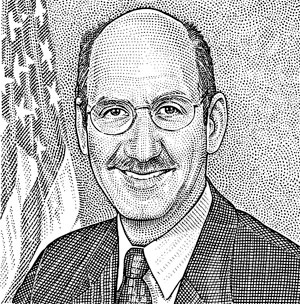Reichley ’83 Works for Compromise in Pa. Legislature
By Matt Sinclair ’90
IN AN ERA of political extremism, Pennsylvania State Representative Doug Reichley ’83, a Republican from the 134th District, is a throwback to the days of mutual respect
among public servants.
He and his siblings were brought up by politically active parents (his father a Republican, his mother a Democrat) to value public service. “My parents imbued us with a sense of there but for the grace of God go I. ‘When you’re fortunate enough to have had a beneficial background, you owe it to society to give back and help,’ they said.”
 Prior to running for office, Reichley, who holds a J.D. from Penn State’s Dickinson School of Law, worked in private practice and as an assistant district attorney in Philadelphia and Lehigh County. He was first elected to a two-year term in the Pennsylvania House in 2002 and has been re-elected four times.
Prior to running for office, Reichley, who holds a J.D. from Penn State’s Dickinson School of Law, worked in private practice and as an assistant district attorney in Philadelphia and Lehigh County. He was first elected to a two-year term in the Pennsylvania House in 2002 and has been re-elected four times.
In his committee assignments, Reichley has tackled some challenging and important issues, including health care and the state’s budget. Pennsylvania has the third-oldest population in the country, and the right solution for residents is not a clear-cut decision.
“Pennsylvania is in a fiscal climate in which we’re seeing lower tax revenues and higher historical levels of spending, so we’re trying to reconcile those without too much of a tax burden on citizens,” he says.
It pleases Reichley that he and his staff have always worked to craft legislation and conduct the public’s business keeping in mind the interests of his district, regardless of party. In recent years, ideological differences have been harder to bridge, he says.
“I think there is not enough time and effort devoted by newly elected people to finding ways to work together. I believe 99.99 percent of elected officials are there to do the utmost for their constituents. But there are often wide differences in constituencies that make it difficult, if not impossible, for people to agree,” he says.
“The ideological extremes tend to hamper the ability of members of the legislature to find pragmatic compromises. That tends to contribute to the idea that they’re not as efficient or productive as they should be.”
Reichley emphasizes that the legislature is focused on helping Pennsylvania emerge from the recession as strong as possible while also addressing “commensurate concerns about maintaining levels of services in areas like health care.” Other major issues include conflicts over natural-gas drilling, pension levels for state employees, and, for eastern Pennsylvania in particular, trying to balance the demand for development with the maintenance of sufficient open space for the health of the environment and the public.
Early this year, Reichley announced he will run for judge in Lehigh County. No matter the outcome, he will continue to advocate for youth becoming more involved in public service, and he hopes his connections with Lafayette aid in that effort.
Reichley keeps in touch with James Lennertz, associate professor of government and law, who instills the values of being involved in politics and public service in his courses. Reichley taught one of Lennertz’s courses when the professor was on sabbatical in 1992.
“The kind of popular advocacy that Jim Lennertz called for when I was a student is missing in a lot of the generations of students I’ve seen since I left college,” Reichley says. “There’s a lot to be said for giving back to the community and looking at the situations around you with a wider perspective.”